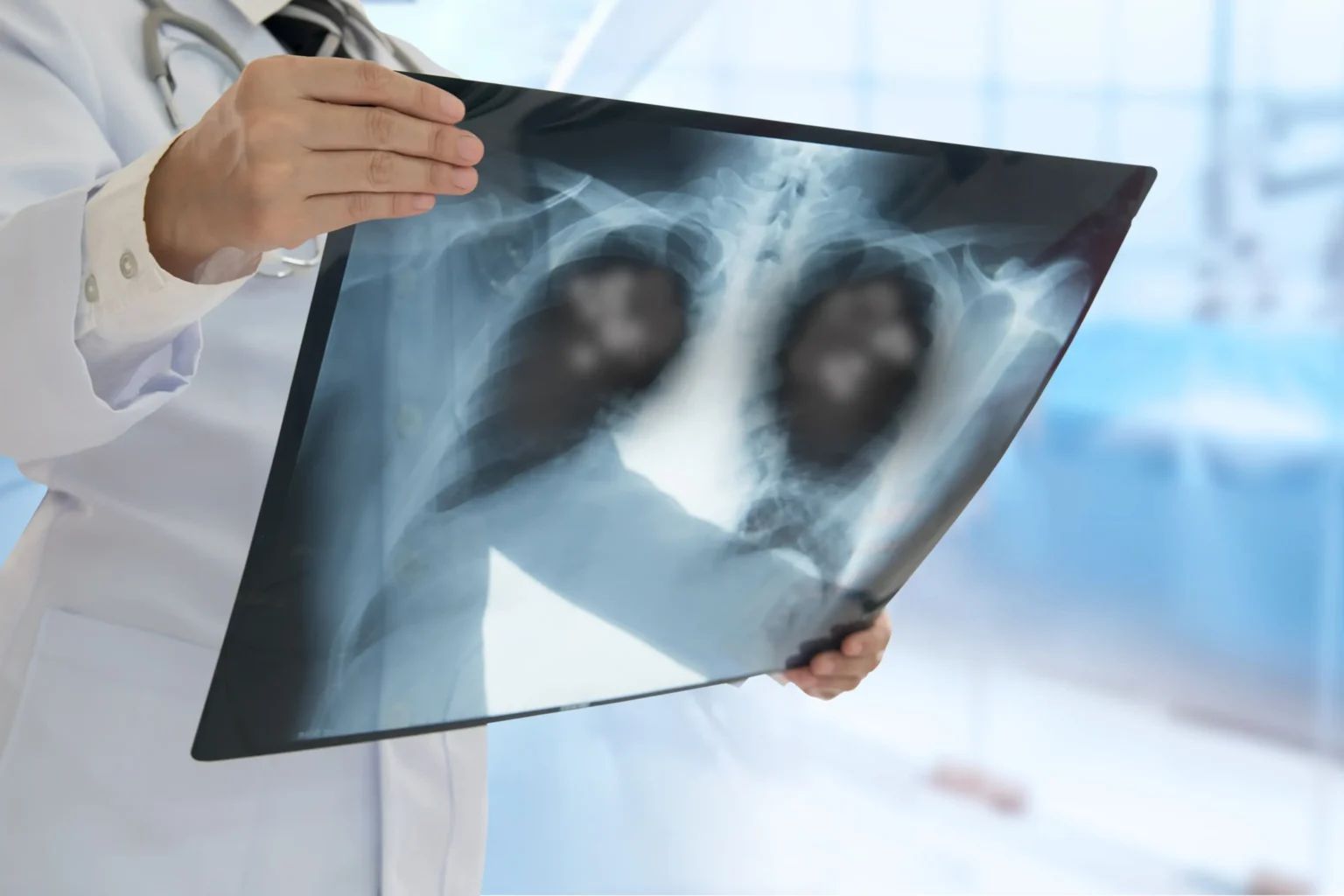Pneumonia
Recognize the signs of pneumonia early and seek immediate medical attention.
Request An AppointmentRefer A Patient
What is Pneumonia
Pneumonia can affect individuals of all ages, but older adults, young children, and those with weakened immune systems or chronic health conditions are at greater risk.
Table Of Contents
Causes of Pneumonia
Pneumonia can be caused by a variety of microorganisms, including:
- Bacteria: The most common cause of pneumonia in adults is Streptococcus pneumoniae, although other bacteria, such as Haemophilus influenzae, can also be responsible.
- Viruses: Viruses such as the flu virus, respiratory syncytial virus (RSV), and coronaviruses can cause viral pneumonia.
- Fungi: Fungal infections, although less common, can also lead to pneumonia, especially in individuals with weakened immune systems.
In some cases, pneumonia may develop after another illness, such as the flu or a cold, weakens the lungs and makes them more susceptible to infection.

Common Symptoms of Pneumonia
Recognizing the symptoms of pneumonia early can lead to prompt treatment and a quicker recovery. Common signs include:
- Persistent cough, often producing mucus
- Shortness of breath or difficulty breathing
- Chest pain, especially when breathing or coughing
- Fever or chills
- Fatigue or weakness
- Nausea or vomiting (in some cases)
It’s important to seek medical care if symptoms persist or worsen.
Diagnosing Pneumonia
A healthcare provider will typically diagnose pneumonia through a combination of the following:
- Physical exam: The provider will listen to the lungs with a stethoscope to check for abnormal sounds like crackling or wheezing.
- Chest X-ray: An X-ray can confirm the presence of pneumonia and help determine its severity.
- Blood tests: These may be done to identify the infection and assess the body’s response.
- Sputum test: A sample of mucus may be tested to identify the cause of the infection.
Based on these findings, the provider will recommend a treatment plan tailored to the patient’s condition.
Risk Factors for Developing Pneumonia
Certain factors can increase the likelihood of developing pneumonia, including:
- Age (children under 2 and adults over 65 are at higher risk)
- Chronic health conditions, such as asthma, COPD, or heart disease
- Smoking or exposure to secondhand smoke
- Weakened immune system due to conditions like HIV/AIDS or cancer treatments
- Recent viral infections, like the flu
Individuals who are at higher risk should take extra precautions to prevent respiratory infections and seek prompt medical attention if symptoms of pneumonia arise.
Treatment Options for Pneumonia
The treatment for pneumonia depends on the cause and severity of the infection. Common treatment options include:
- Antibiotics: For bacterial pneumonia, antibiotics are often prescribed to target the specific bacteria responsible for the infection.
- Antiviral medications: If the pneumonia is caused by a virus, antiviral drugs may be used, particularly in cases of influenza or COVID-19.
- Supportive care: Rest, fluids, and over-the-counter medications to reduce fever and pain are often recommended for mild pneumonia.
- Hospitalization: Severe pneumonia may require hospital care, where patients can receive oxygen therapy and intravenous medications.
With appropriate treatment, most individuals with pneumonia can recover. The recovery time may vary based on age, overall health, and the severity of the infection, but remember, recovery is possible.
Preventing Pneumonia
Preventing pneumonia involves protecting the lungs from infection and maintaining good overall health. Strategies include:
- Vaccination: Vaccines like the pneumococcal vaccine and flu shots can reduce the risk of pneumonia caused by certain bacteria and viruses.
- Good hygiene: Regular handwashing, avoiding close contact with sick individuals, and covering the mouth when coughing can help prevent the spread of infections.
- Smoking cessation: Quitting smoking improves lung health and reduces the risk of respiratory infections, including pneumonia.
- Managing chronic conditions: Keeping conditions like asthma, COPD, and diabetes well-managed can help lower the risk of developing pneumonia.
Frequently Asked Questions
0
What is the most common cause of pneumonia?
Bacterial infections, particularly Streptococcus pneumoniae, are the most common cause of pneumonia in adults.
0
How is pneumonia different from the flu or a cold?
While the flu and cold can cause symptoms similar to pneumonia, pneumonia typically involves more severe symptoms like difficulty breathing, chest pain, and a persistent cough with mucus
0
Can pneumonia be prevented?
Yes, vaccines, good hygiene, and quitting smoking are effective ways to reduce the risk of developing pneumonia.
0
How long does it take to recover from pneumonia?
Recovery time varies depending on the severity of the infection, but most individuals can start feeling better within a few weeks to a couple of months.
0
When should medical attention be sought for pneumonia?
If symptoms like shortness of breath, chest pain, or high fever persist or worsen, it is important to seek medical attention immediately.

